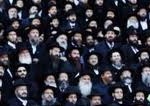Harder on your own – B’ha’alot’cha
 Middle men are useful. They can shuttle from one side to the other to broker a deal.
Middle men are useful. They can shuttle from one side to the other to broker a deal.
Without them there is often a stand off; nothing happens if neither side will budge.
But there are some situations in which intermediaries are neither needed nor wanted.
One such situation is described in the sidra, when God says of His relationship with Moses, Peh el peh adabber bo – “I speak with him mouth to mouth” (Num. 12:8).
Other human beings, even prophets, struggle for direct access to God, but not Moses. In contemporary terms, we would say that he has a direct line to the Almighty.
Of course some people think the rabbi enjoys the same privilege and has God’s ear whenever he wants it.
It is thought that all that is necessary is to get the rabbi to have a word On High and the weather will become perfect, just right for a wedding or outdoor event.
Others think the rabbi is privy to the secrets of heaven and earth and can explain precisely what God has in mind and how He runs His universe.
If only it were so easy. Unfortunately the rabbis are neither omniscient nor oracles, neither prophets nor sons of prophets. The ultimate questions of existence are a puzzle to them too.
So why bother having rabbis if they have no direct line to God, no answers to the great enigmas?
Because though rabbis are not possessed of magical means to erase the anxieties of being human, they can access the record of how earlier generations addressed the issues.
They may not have instant answers, but they can say, “It’s not a new problem: let’s see how the great minds of the past tried to handle it, how they defined the question, what options they eliminated as their minds kept searching for the solution.”
They can also say, “Instant answers are no answers to anything. Responding to problems has to be a struggle.”
The Talmud (B’rachot, chapter 1) asks why the evening Shema precedes the morning Shema. It notes that this was the sequence of creation: the Torah says, “And it was evening and (then) there was morning, one day”. First there was darkness; only then was there light.
Redemption only comes after a night of fear and doubt. The sun is shining because of the hours when we could hardly see.
Not even rabbis can dispense with the striving for the answers, but they can hold your hand firmly as you walk through the times of struggle, and help you not to stumble and give up on God, life, hope and faith.



